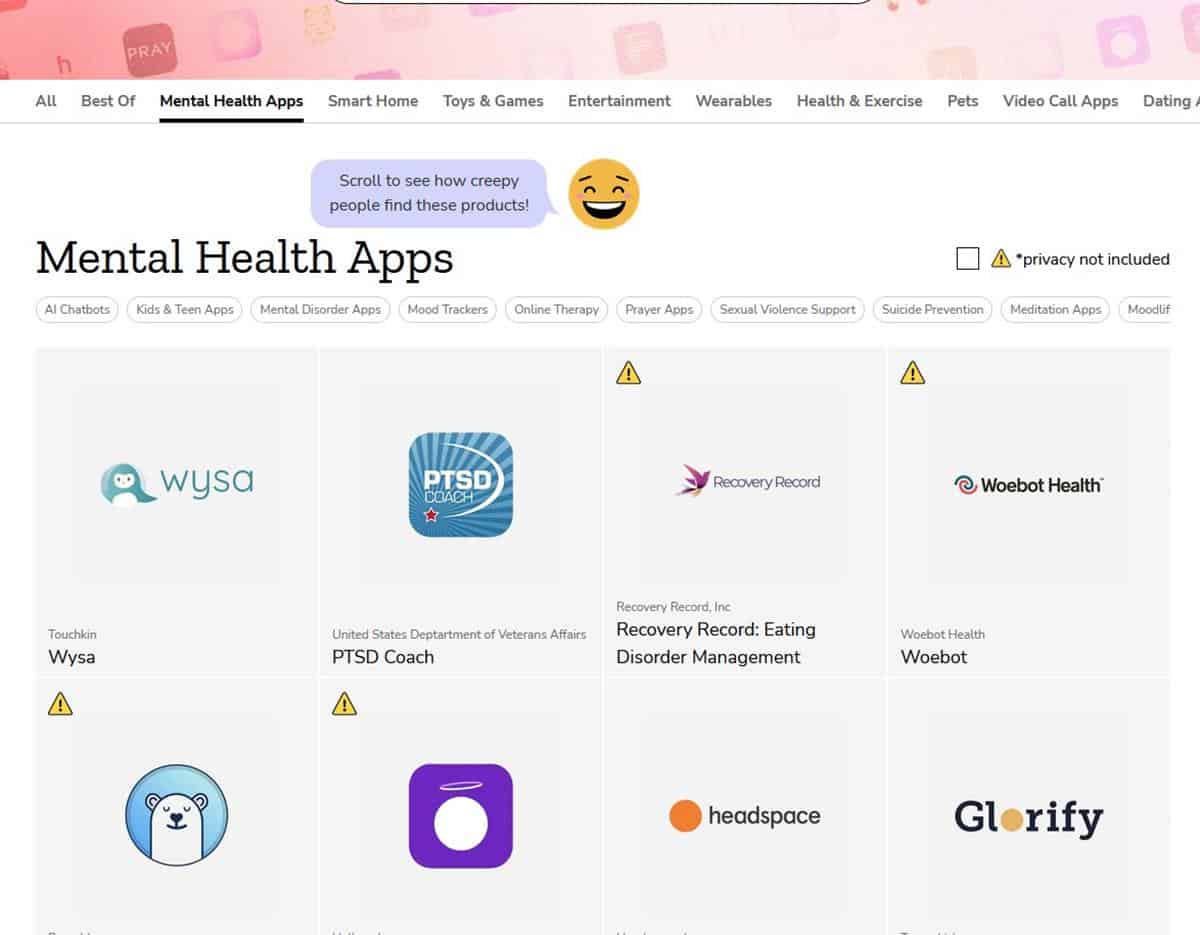Mozilla has released a report after analyzing various mental health apps and prayer apps. The results aren’t nice, these apps are spying on users and selling personal data to third parties.

The research conducted by the Mozilla Foundation scrutinized 32 apps in order to find out what kind of privacy policies they practice. Shockingly, 28 of these apps were given the “Privacy Not Included” warning label.
Worst offenders in Mozilla’s – Privacy Not Included
- Better Help
- Better Stop Suicide
- Pray.com
- Woebot
- Youper
- Talkspace
According to the report, the first two apps have vague and messy privacy policies, the next three in the list share personal data with third parties, while the last one collects chat transcripts from users. That is creepy, isn’t it?
The security practices of the apps were also found to be abysmal, and allowed weak passwords such as 1 or 11111111. Imagine having a single letter or number as a password as the lock for an app that contains your personal data, that is a privacy nightmare. It gets worse. The researchers at Mozilla term these mental health apps as a data harvesting bonanza. The report reveals that some apps tracked users, harvested data from their Facebook profile, and the users’ phones. The collected data is then sold to insurance companies and data brokers, for a profit. Mozilla warns that information that kids and teenagers share using such apps could be used for marketing, or target them with personalized ads.
List of apps with the Privacy Not Included warning
- 7 Cups
- Abide
- Bearable
- Breathe, Think, Do with Sesame
- Calm
- Hallow
- Happify
- King James Bible – Daily Verse and Audio
- Liberate
- Mindshift CBT
- MindDoc
- Modern Health
- Moodfit
- NOCD
- Pride Counseling
- RAINN
- Recovery Record: Eating Disorder Management
- Sanity & Self
- Sanvello
- Shine
- Superbetter
- The Mighty
In my eyes, these are practically malware. If you use one of these apps, check if you can delete your account with the service, and then uninstall the app. Look for offline and/or open source alternatives for mental health and prayer apps. I recommend Android users to take a look at the F-droid repository, there is a good chance that you may find an app similar to the one you were using. All apps listed on the repository are open source, and many of them are also available on the Google Play Store.
The trustworthy apps
- PTSD Coach
- Wysa
There were just two apps in the entire list that Mozilla says are trustworthy, PTSD Coach, made by the U.S. The Department of Veterans Affairs, and Wysa, an AI Chatbot. The report says that both apps respect the privacy of users.
The other two apps without the warning label are Glorify, and Headspace, though Mozilla hasn’t given them the clean chit. You can check the list of the apps tested by Mozilla on the Privacy Not Included website. Click on the app’s name to view a detailed description of the privacy practices, and permissions used by the app such as camera, location, microphone access, etc.
You’re probably thinking, this whole ordeal is not really surprising. We live in a world where every big tech company is spying on us through apps, search queries and general internet usage. Google, Facebook, Amazon, and the others probably know everything about you already. I agree, but is that any reason to just give up your privacy rights?
Mental health is just as important as physical health. Even a small dose of positivity could save a depressed person’s life. It’s perfectly normal for people who are recovering from Anxiety, PTSD or domestic violence to seek help via therapy and/or support from family and friends. It’s not hard to see why having an app that you can access from your phone could help someone stay motivated, especially if therapists are far away or are too expensive.
But when these Mental Health apps that the user relied on for helping them get on with life, exploit the user and sell their medical history and other data to third-parties, it is truly disgusting. It is hard enough for these folk to face the challenges of daily life, yet these soulless companies are preying on the weak, just to line their pockets, with no regard for privacy.
Thank you for being a Ghacks reader. The post Mozilla says that some mental health and prayer apps have serious privacy issues appeared first on gHacks Technology News.
